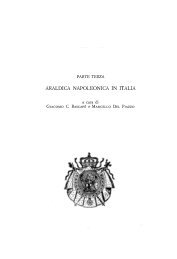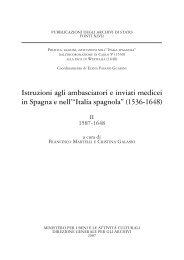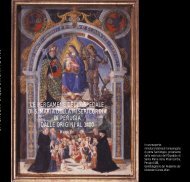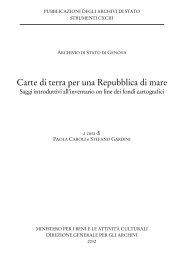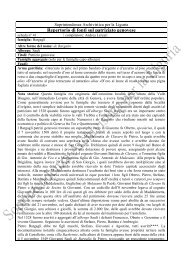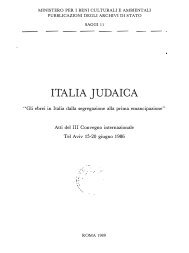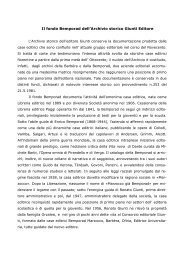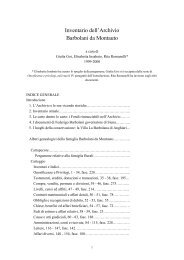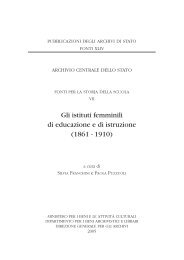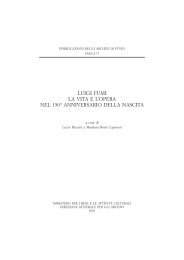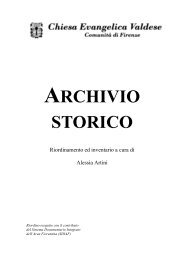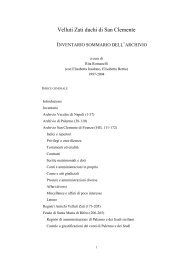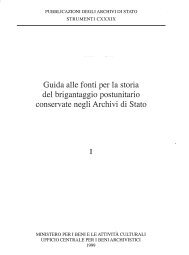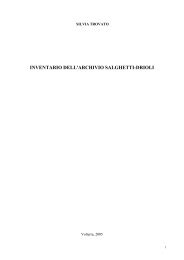ITALIA JUDAICA - Direzione generale per gli archivi
ITALIA JUDAICA - Direzione generale per gli archivi
ITALIA JUDAICA - Direzione generale per gli archivi
Create successful ePaper yourself
Turn your PDF publications into a flip-book with our unique Google optimized e-Paper software.
150<br />
Abraham Melamed<br />
rage opt1m1sm concerning possibilities of creative action in politics. Humanist<br />
historians generally felt themselves to be on the upswing of a new cycle destined<br />
to witness great events 36• Luzzatto's optimistic revaiuation of the future of<br />
the Jewish people, amidst the reverberations of the greatest catastrophe which<br />
befell the Jewish peopie since the destruction of the Second Tempie, presents<br />
the same optimistic interpretation of the cyclicai theories in a Jewish context.<br />
This application to the history of the J ewish people of the Machiavellian<br />
assertion that decay is naturally followed by renewed grouth can be viewed<br />
as a rationalistic, even secuiar interpretation of the Messianic idea which was<br />
widespread in Jewish thought after the Iberian catastrophe. These Messianic<br />
ideas often appeared in mysticai and cabbalistic contexts 37• In Luzzatto's case,<br />
being influenced by the politicai theory of the « Ragione di Stato », we aiready<br />
find the Messianic idea in a modern, almost secular presentation.<br />
The attempt to prove the su<strong>per</strong>iority and uniqueness of the Jewish people<br />
has been a traditional theme in Jewish thought since the Hellenistic <strong>per</strong>iod.<br />
This attempt was generally reiated to the Jewish achievements in the fields<br />
of theoiogy, science and philosophy 38 • Luzzatto presents a new variation on<br />
the old theme, the Jewish nation as unique in human history, being the only<br />
ancient peopie to survive the pressurs of time. Despite the fact that the Jews<br />
suffered more then any other nation, and - paradoxically - because of this<br />
reason, the Jewish nation was seen by Luzzatto as about to rise again. Thus,<br />
the Jews are <strong>per</strong>ceived as the only peopie that could escape the historical cycle<br />
and evade the natural processes. This is a Machiavellian interpretation of the<br />
Messianic idea.<br />
Machiavelli and his followers based the theory of the cyclicai iaw of history<br />
upon a pessimistic approach to human nature and the theory of «necessità ».<br />
History repeats itself since human nature always remains the same. Man is<br />
Iazy and indoient in his very nature. He is active only because of the pressures<br />
of existence, which force him to be industrious and virtuous in order<br />
to provide for ali his needs and ensure his continuous existence. When he reaches<br />
materia! success, however, the pressures of existence abide and man Ioses the<br />
good virtues he acquired. This necessarily causes the Ioss of his material<br />
36 J. A. MAZZEO, Renaissance and Revolution ... cit., p. 42.<br />
37 Y. H. YERUSHALMI, Clio and the ]ews ... cit., pp. 626-627; A. DAviD, R. Gedalya<br />
ibn Yahia ... cit., pp. 67-68; A. A. NEUMAN, The Shebetb Yehudah ... cit., p. 259; B. NETA<br />
NYAHU, Don Isaac Abravanel, Statesman ... cited.<br />
38 Y. H. YERUSHALMI, From Spanish Court to Italian Ghetto, New York 1971, eh. 6;<br />
N. RoTH, The T be/t of Philosophy by the Greeks from the ]ews, in « Oassical Folla »,<br />
32 (1978), n. l, pp. 53-67; R. BoNFIL, Bituyym le' Yehud Am Israel be' Italia be' Tekufat<br />
ba' Renaissance, in « Sinai », 76 (1975), pp. 1-11. In Abravanel (see B. NETANYAU,<br />
Don Isaac Abravanel, Statesman ... cit., p. 304, n. 34); in Ibn Yahia (see A. DAVID, R. Gedalya<br />
Ibn Yahia ... cit., pp. 70-73); in de' Rossi (see S. W. BARON, Azariah de' Rossi's<br />
Attitude .... cit., pp. 29-30, 37); in Luzzatto himself, Discorso ... cit., eh. 16.<br />
The Perception of Jewish History in Italian fewish Thought 151<br />
acievements. Then, the Iaw of «necessità » - the renewed pressures of<br />
exl te ce - forces man to endeavour again and return to virtuous behaviour.<br />
Th1s 1s the <strong>per</strong>petuai rise and fall in human nature ( « così girono le cose del<br />
mondo » ). The continuai rise and fall of governments, nations and states is<br />
a by-product of the basic weakness inherent in human nature 39•<br />
Luzzatto a . dheres to the Machiavellian theory and maintains that by the<br />
p : essures of ex1stence ( « bisogni o »), man is forced to work, to morally refine<br />
h1mself and develope arts and crafts and the various institutions of human<br />
culture 40• Adapting the theory to Jewish history, he argues that since the<br />
pressures of existence are stronger on the Jews than on any other peopie<br />
they consequently also excel more then any other peopie 41• Again, we find<br />
how . Lu zatto empioyed a basic Machiavellian concept in order to prove the<br />
supenor1ty of the Jewish nation.<br />
* * *<br />
The same tendency to explain Jewish history by rational and natura!<br />
processes can also be found in Luzzatto's famous refutation of Tacitus' libels<br />
against the Jewish nation in the fifteenth chapter of his Discorso. When Luzzatto<br />
attempted to prove to contemporary Christians - via Tacitus - that<br />
the Iibels against the J ews were unfounded and to expiain to them the real<br />
meaning of Jewish religion and customs, he consciously refrained from theoiogi<br />
al explanatons wich he regarded as irrelevant for a Pagan and a politicalmmded<br />
man hke Tacltus. Luzzatto employed politica! and utiiitarian reasoning<br />
which a man like Tacitus could comprehend 42•<br />
Tacitus exerted a profound influence upòn sixteenth and seventeenth centur<br />
historiography and political thought. The influence of his ideas is most<br />
n ? tlceaIe upon Machiavellism and the ensuing politicai theory of the « Ragwne<br />
d1 Stato » 43•<br />
39 N MA A D " . . .<br />
· cm . ELLI, zscorsz ... c1 ., p. 82: « ... gh uomini non o<strong>per</strong>ano mai nulla bene,<br />
ogru cosa d1 confusione e di disordine ». See also P. BuRKE, Tradition and Èx<strong>per</strong>ience ...<br />
se on pe : necess ta; ma, dove la eleziOne abonda, e che vi si può usare licenza si riempie<br />
40 · LuzTTO IJ_iscorso ... cit., c. 18r: «Reclama il comune de gl'huomini che la<br />
nat ra . li h . abl . mca 1c t1, et vessati d'urgentie, e necessita in gran copia più che a gl'altri<br />
J.>.mm mv1 . di ag1om : t_n a mtra dovere si lamenta, <strong>per</strong>che l'indigenza et il bisogno sono<br />
h ver St<br />
uli et 1mpuls1v1 ali mventioni, e rit rovamenti dell'arti più degne, et eccellenti... ».<br />
. .<br />
1<br />
Iz., c . . 18v: . « . N_ella Sc la . el d1sagg10 sotto la rigorosa disciplina di esso bisogno,<br />
sono ;ud1 1, et mstrultl h . Hebrel pm che ogn'altra natione ... ».<br />
Ibzd., c. 70 : «Disputando con un Gentile non occorre portarli ragioni de quali<br />
egh vuole esserne mcapa



